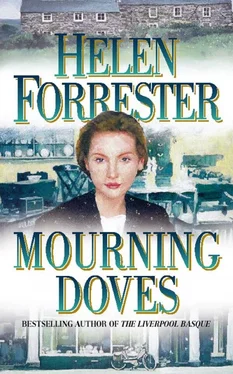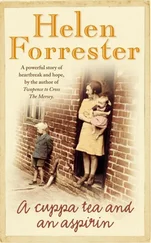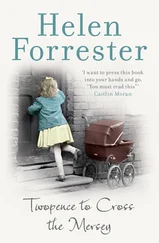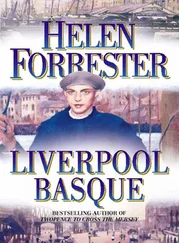Paul was an electrical engineer, a director in his family firm which had grown hugely during the war, because of the international reputation of its engineers and their innovative approach to new problems. He had just completed managing a lucrative seven-year contract for the wiring of an entire city in Brazil. He and Edna would, according to Louise, sail for home this month. Once he was resettled in England, considered Cousin Albert, Paul Fellowes would certainly be able to afford to take in a couple of women, who would probably make themselves useful in his house, as such women always did.
On the other hand, he pondered, if they would agree to live in the cottage and were very careful, they should be able to manage on the rents from Louise’s six houses in Birkenhead. The rents, in addition to the annuity which he proposed to buy for them from the proceeds of the sale of the West Derby house, should be enough for two women to live on.
He knew from his talks with Mr Barnett and with Timothy’s chief clerk that there would, almost certainly, be nothing left of Timothy’s estate. The man owed money everywhere, probably because much of his basic income had come from investment in railways, which, now that the war was over, were not doing very well. Had he lived, he might have been able to pull through a difficult period, but now there was no hope. His few assets must be liquidated to meet his debts.
He trusted that Paul Fellowes would, when he returned to England, help him with the paperwork necessary to wind everything up. Paul should soon receive his letter, sent to Salvador, Brazil, informing him of his father-in-law’s death and asking him to break the news to his wife.
It was possible that the couple had already sailed for England before the letter’s arrival. In that case they would receive the news from a telegram, which he had dispatched to Paul’s father at their company head office in Southampton. Edna’s last letter to her mother had mentioned that they expected to dock in Southampton and spend a few days with Paul’s parents before coming north to visit her own parents.
As Louise and Celia struggled round the overgrown garden of the cottage by the sand dunes, Louise mentioned how relieved she would be to see Paul and Edna.
Celia agreed. She had almost forgotten what the couple looked like. She had never had a great deal to do with her elder sister, and she had met Paul only three times, so she was not particularly hopeful of being comforted. Their presence would, however, add a sense of stability to Louise in her shattered state, for which she would be grateful.
If Paul returned quickly enough, thought Celia, he would, at least, be someone to consult about the cottage – if he had any time; she had always understood from her father that businessmen never did have much time to spare for the affairs of women.
Standing in the cottage garden after the stuffiness of the house, it was a relief to Celia to breathe clean, salt-laden air, and, despite its total neglect, there was a healthy smell of damp earth and growing things.
At the bottom of the garden, they inspected an earth lavatory.
‘It’s utterly disgusting!’ Celia exclaimed. ‘Did you really use it?’
‘Yes,’ Louise admitted. ‘It wasn’t something we looked forward to. It was your father’s main objection to continuing to come here for holidays.’ She began to whimper, as she recalled with anguish the handsome water closet which Timothy had had installed in their West Derby home.
‘Perhaps we could get a proper bathroom put in here,’ Celia suggested doubtfully, as she shut the door firmly on the obnoxious little hut. Though she had long since learned that, to survive, she must bow her head and do whatever her parents decided, even her broken spirit had, on inspecting such primitive sanitary arrangements, begun to feel a sense of revolt.
After several days of being confined indoors, the fresh air was reviving Louise, and she looked around her, and sighed. She replied quite coherently, ‘I don’t think we could put in a water closet, without piped water and drains.’ Then she exclaimed with something of her normal impatience, ‘What a mess! I can’t imagine what kind of a tenant must’ve been living here. Mr Billings must have been very careless about his selection of one.’
Celia contemplated the jungle of weeds and sprawling bushes round her. ‘Did he pay the rent? The tenant, I mean,’ she asked practically.
Her mother shrugged. ‘I don’t know. Your father took care of these things.’
Celia turned to stare at the back of the house. The roof looked all right, no slate tiles missing and the chimneys were all intact, as far as she could judge. Her eyes followed the ridge of the roof, and she remembered suddenly that there was another house attached to theirs.
‘Do you own the house next door, Mother? I can see that the other side of the hedge has been trimmed, and there are curtains in the bedroom windows – and smoke is coming from the chimney. Someone must live there.’
Her mother looked up. ‘No, I don’t own it. My father bought this house simply as a summer cottage, rather than as an investment, and when he died he left it to your Aunt Felicity.’
Anxious to encourage her mother to take an interest in anything, Celia asked, ‘Who does own it?’
‘A Mr and Mrs Lytham bought the other side. I used to play with their children.’ Louise’s expression softened, and she added wistfully, ‘We had some lovely times, playing in the sand dunes and paddling in the sea. I wonder what happened to them?’
Celia forced a smile. ‘How nice that must have been.’ Then she looked at her brooch watch. ‘Perhaps we had better lock up, Mother, and go to have a talk with Mr Billings. He could advise us about repairs.’
Her mother nodded and they retraced their steps to the house, ruefully brushing down their long skirts. Even Celia’s ankle-length, tailored skirt had caught in the undergrowth and had burrs and bits of leaves and seeds clinging to it.
Celia locked the back door and they walked slowly and dismally through the house, leaving muddy tracks behind them.
While Celia turned to secure the inner front door, Louise proceeded slowly down the front steps. She suddenly let out a frightened little cry, ‘Oh!’
Celia spun round.
Standing in the middle of the red-tiled path was a tall thin man. As the women stared at him, he raised his cap and bowed. ‘Good afternoon,’ he greeted them politely.
Confronted by a man, both women were suddenly acutely aware of how isolated the cottage was.
Walking down the lane to it, they had passed only one other cottage, a squat little dwelling with a thatched roof. It had, Louise told Celia, been lived in for centuries by a family of fishermen. Now, they stared uneasily at someone who seemed to have sprung from nowhere.
‘Good afternoon,’ responded Celia nervously, while her mother stiffened, as she catalogued the man as no gentleman, despite his courteous greeting. The lanky man’s grey hair was roughly cut and framed a lined, weather-beaten face. He wore a striped union shirt without a collar; a red and white cotton handkerchief was tied round his neck. His wrinkled, old-fashioned moleskin trousers, held up by a worn leather belt, were stained with dried mud.
As he looked down at her, Louise’s silence did not seem to disconcert him in the least. His faded blue eyes held the hint of a smile, as he said, ‘You must be Mrs Gilmore. The gentleman as was here to take a quick look at the cottage for you said as you would be coming. He come out late Tuesday. Nearly dark, it was.’
A quiet rage against Cousin Albert rose in Louise, blotting out all sense of fear or grief. So, during his stay with her, he had not spent all his time in Timothy’s office checking over with the clerk just exactly what the financial situation was; he had also been out here, planning to condemn her to live in this awful place. He knew precisely what it was like.
Читать дальше












